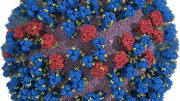
A recent study suggests that reducing processed meat consumption by about one-third could prevent over 350,000 diabetes cases in the U.S. over ten years. Researchers from the University of Edinburgh and the University of North Carolina developed a simulation tool to analyze the health impacts of reducing processed and unprocessed red meat consumption. The study found significant potential health benefits, including reductions in cardiovascular disease and colorectal cancer cases, particularly among white males and those with moderate incomes. The research, which calls for further study due to limited data on unprocessed red meat, highlights a win-win situation for health and environmental sustainability.
A study indicates that reducing processed meat consumption by about one-third in the U.S. could prevent over 350,000 diabetes cases in ten years, as well as significantly decrease cardiovascular disease and colorectal cancer cases. Researchers used a microsimulation to analyze the impact of reducing both processed and unprocessed red meat intake on multiple health outcomes.
Cutting down on processed meat consumption by approximately one-third could help avoid over 350,000 diabetes cases in the US within a decade, according to a study.
Cutting US adults’ processed meat intake by 30 percent – the equivalent of around 10 slices of bacon a week – would also lead to tens of thousands of fewer cases of cardiovascular disease and colorectal cancer, researchers say.
A team from the University of Edinburgh’s Global Academy of Agriculture and Food Systems together with the University of North Carolina, Chapel Hill, has developed a simulation tool to estimate the health impacts of reducing consumption of processed meat and unprocessed red meat.
While many studies have identified links between high levels of processed meat consumption and chronic disease, few have evaluated the impact on multiple health outcomes. Some previous research also suggests unprocessed red meat may contribute to chronic disease risk but evidence is still limited.
Simulation Findings
The researchers used data from a Centers for Disease Control and Prevention (CDC) national health survey to create a simulated, representative sample of the US adult population – a so-called microsimulation.
Their microsimulation is the first to estimate the effects of reducing processed meat and unprocessed red meat consumption – from between 5 and 100 percent – on multiple health outcomes in the US.
The team estimated how changes in meat consumption affect adults’ risk of diabetes, cardiovascular disease, colorectal cancer, and death. The effects were evaluated in the overall population and separately based on age, sex, household income, and ethnicity.
As well as preventing more than 350,000 cases of diabetes, cutting processed meat intake by 30 percent would lead to 92,500 fewer cardiovascular disease cases and 53,300 fewer colorectal cancer cases over a decade, researchers say.
In this scenario, white males and those with an annual household income between $25,000 and $55,000 were found to experience the greatest health benefits.
Comparing Meat Types
Researchers also analyzed the impacts of reducing unprocessed red meat intake alone and cutting consumption of both processed meat and unprocessed red meat.
Reducing consumption of both by 30 percent resulted in 1,073,400 fewer diabetes cases, 382,400 fewer cardiovascular disease cases, and 84,400 fewer colorectal cancer cases.
Cutting unprocessed red meat intake alone by 30 percent – which would mean eating around one less quarter-pound beef burger a week – resulted in more than 732,000 fewer diabetes cases. It also led to 291,500 fewer cardiovascular disease cases and 32,200 fewer colorectal cancer cases.
The finding that more disease cases were prevented by reducing unprocessed red meat compared to processed meat is partly due to the average daily intake of unprocessed red meat being higher than processed meat, at 47g a day versus 29g a day, respectively.
As less is known about the effect of eating unprocessed red meat on chronic disease risk, the team says these estimates should be interpreted with caution and that more research is needed.
Professor Lindsay Jaacks, Personal Chair of Global Health and Nutrition at the University of Edinburgh, and one of the authors of the study, said “Cutting consumption of meat has been recommended by national and international organizations to reduce greenhouse gas emissions, including the Climate Change Committee here in the UK and the United Nations Intergovernmental Panel on Climate Change or IPCC. Our research finds that these changes in diets could also have significant health benefits in the US, and so this is a clear win-win for people and the planet.”
Reference: “Estimated effects of reductions in processed meat consumption and unprocessed red meat consumption on occurrences of type 2 diabetes, cardiovascular disease, colorectal cancer, and mortality in the USA: a microsimulation study” by Joe Kennedy, Peter Alexander, Lindsey Smith Taillie and Lindsay M Jaacks, July 2024, The Lancet Planetary Health.
DOI: 10.1016/S2542-5196(24)00118-9
The study was funded by The Wellcome Trust.









I agree with these conclusions.
In early 1981, at age thirty-seven, I became mysteriously, seriously ill with chronic fatigue, generalized aches, pains and muscle weakness and serious mood swings. All a thorough medical examination indicated-for was a high serum level of uric acid and a low oral temperature. In late 1981 I learned I was mildly allergic to most of what I regularly ingested and, based on at-home experimentation, I cut my animal protein intake by about half, for allergy reasons. In 1992 I was first diagnosed with high blood pressure, cholesterol and triglycerides; still. By 2002 I learned of the 1980 US FDA approval of the expanded use of added toxic artificially cultured “free” MSG and first wrote the FDA of it in 2005, in-vain, thousands of others since. Any/all American cohort studies that don’t factor-in my (Dr. Arthur F. Coca’s) kind (https://www.seleneriverpress.com/historical/nonreaginic-allergy-in-theory-and-practice/) of still medically unrecognized food allergies, FDA approved food poisoning and/or excessive related resultant medical errors are simply ignorant, incompetent and, perhaps, even treasonous.